In Portugal, SID 2025 featured various events and engaged over 2,000 participants in discussions on digital citizenship, cybersecurity, and online safety.
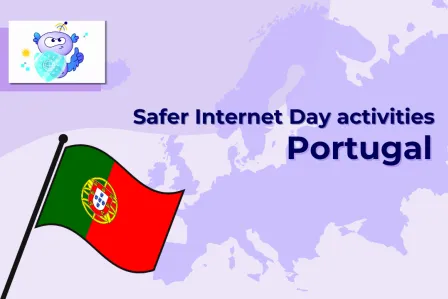
Between 11 and 13 February 2025, Portugal reaffirmed its commitment to Digital Citizenship Education through a series of engaging and impactful activities for Safer Internet Day (SID 2025). For three days, students, teachers, policymakers, and parents, among others, came together to discuss, learn and work together to build a safer and more responsible digital future. The SID 2025 main action engaged a total of 2,109 participants who took part in workshops, a high-level seminar and its streaming, as well as a roadshow for schools.
The event included 19 practical workshops involving 450 students from 10 schools, covering cyberbullying, digital wellbeing, fake news, AI ethics, and other topics which empower youngsters towards a cybersecurity culture. The involvement of 20 digital leaders was instrumental in making the learning experience dynamic and relatable. The overall evaluation of the activities was extremely positive: participants rated them as "Very good" (66%) and "Good" (30%). These results illustrate the effectiveness of the hands-on learning, which encourages students to actively participate. In the evaluation survey, students were asked what topics they would like to see covered in future editions of Safer Internet Day. The responses were as follows: Gaming (36%) was the top choice for 6-10 year olds, followed by gaming (32%) for 11-12 year olds, illegal online content (31%) for 13-15 year olds, and cyberbullying (36%) for over 18-year-olds.
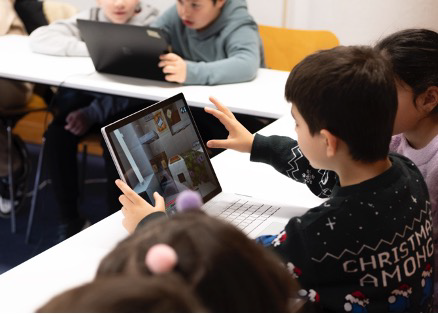
In the afternoon, the "Learning to Be Digital" seminar brought together policymakers, educators, researchers and young digital leaders to discuss the most important aspects of Digital Citizenship Education, with a total of 300 participants. Among those who responded to the survey, 62% rated the seminar as "Very good" and 27% as "Good," proving it to be highly relevant and impactful. Young representatives on their panel shared their views on the responsibility of digital citizenship and emphasised the need for more awareness and media literacy. The mayor of Aveiro closed the event by emphasising the importance of cross-sector collaboration, education, and policy initiatives in shaping a responsible digital future.
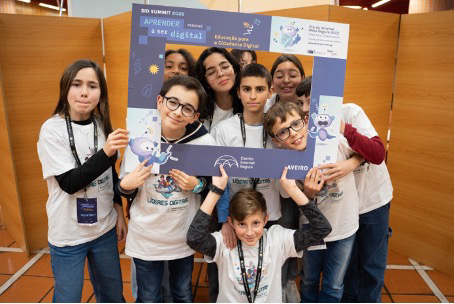
Given the need to expand the main event, SID 2025 continued on 12 and 13 February with a school roadshow to reach more children, parents, and educators. On 12 February, the focus was on early digital education, with 231 kindergarten children taking part in interactive sessions. Two key resources were presented: "ZIGZAGA na NET. Navegar a Cores," a colouring book to promote cyber hygiene, and "Mum, can I go on your phone?" a guide for parents on how to manage screen time. In addition, 600 books were distributed through local health centres in Aveiro to increase awareness of digital safety in the family environment.
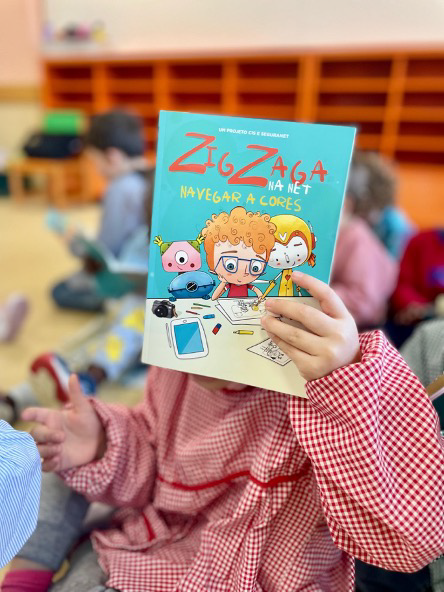
On 13 February, the roadshow continued at the Externato de Penafirme in Torres Vedras, where 420 of the 7th and 8th grade students and 200 parents took part in sessions on the topic of Digital Citizenship Education. The parents also had a session on "Digital and Young People: Are we prepared?" which focussed on online risks, digital wellbeing and practical safety strategies. The event reinforced the idea that engaged and informed parents are crucial to keeping children safe online.
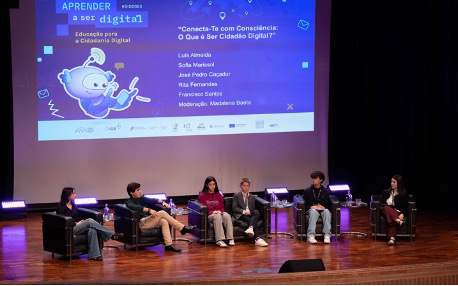
The key takeaway from SID 2025 is that education, collaboration and the active participation of young people are the most powerful tools to tackle the complexities of the digital world. This year’s event was not just a celebration — it was a movement towards a safer, more responsible digital future.
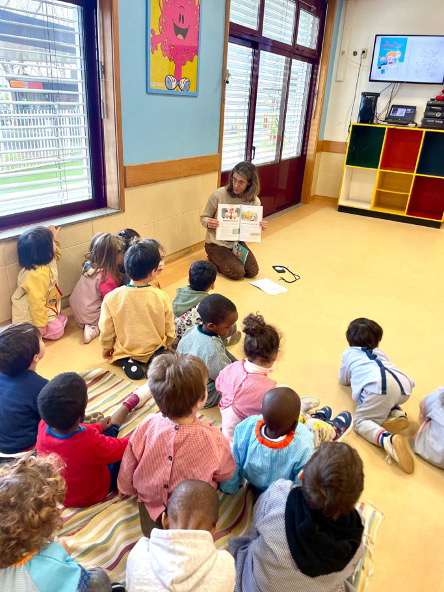
Learn more about Safer Internet Day activities in Portugal on their SID page on our platform!
Further information about the Portuguese Safer Internet Centre can be found on the Better Internet for Kids (BIK) public portal, including links to its national websites and other contact information. Similar information can be found on the BIK portal for all Safer Internet Centres in Europe.
In Portugal, SID 2025 featured various events and engaged over 2,000 participants in discussions on digital citizenship, cybersecurity, and online safety.

Between 11 and 13 February 2025, Portugal reaffirmed its commitment to Digital Citizenship Education through a series of engaging and impactful activities for Safer Internet Day (SID 2025). For three days, students, teachers, policymakers, and parents, among others, came together to discuss, learn and work together to build a safer and more responsible digital future. The SID 2025 main action engaged a total of 2,109 participants who took part in workshops, a high-level seminar and its streaming, as well as a roadshow for schools.
The event included 19 practical workshops involving 450 students from 10 schools, covering cyberbullying, digital wellbeing, fake news, AI ethics, and other topics which empower youngsters towards a cybersecurity culture. The involvement of 20 digital leaders was instrumental in making the learning experience dynamic and relatable. The overall evaluation of the activities was extremely positive: participants rated them as "Very good" (66%) and "Good" (30%). These results illustrate the effectiveness of the hands-on learning, which encourages students to actively participate. In the evaluation survey, students were asked what topics they would like to see covered in future editions of Safer Internet Day. The responses were as follows: Gaming (36%) was the top choice for 6-10 year olds, followed by gaming (32%) for 11-12 year olds, illegal online content (31%) for 13-15 year olds, and cyberbullying (36%) for over 18-year-olds.

In the afternoon, the "Learning to Be Digital" seminar brought together policymakers, educators, researchers and young digital leaders to discuss the most important aspects of Digital Citizenship Education, with a total of 300 participants. Among those who responded to the survey, 62% rated the seminar as "Very good" and 27% as "Good," proving it to be highly relevant and impactful. Young representatives on their panel shared their views on the responsibility of digital citizenship and emphasised the need for more awareness and media literacy. The mayor of Aveiro closed the event by emphasising the importance of cross-sector collaboration, education, and policy initiatives in shaping a responsible digital future.

Given the need to expand the main event, SID 2025 continued on 12 and 13 February with a school roadshow to reach more children, parents, and educators. On 12 February, the focus was on early digital education, with 231 kindergarten children taking part in interactive sessions. Two key resources were presented: "ZIGZAGA na NET. Navegar a Cores," a colouring book to promote cyber hygiene, and "Mum, can I go on your phone?" a guide for parents on how to manage screen time. In addition, 600 books were distributed through local health centres in Aveiro to increase awareness of digital safety in the family environment.

On 13 February, the roadshow continued at the Externato de Penafirme in Torres Vedras, where 420 of the 7th and 8th grade students and 200 parents took part in sessions on the topic of Digital Citizenship Education. The parents also had a session on "Digital and Young People: Are we prepared?" which focussed on online risks, digital wellbeing and practical safety strategies. The event reinforced the idea that engaged and informed parents are crucial to keeping children safe online.

The key takeaway from SID 2025 is that education, collaboration and the active participation of young people are the most powerful tools to tackle the complexities of the digital world. This year’s event was not just a celebration — it was a movement towards a safer, more responsible digital future.

Learn more about Safer Internet Day activities in Portugal on their SID page on our platform!
Further information about the Portuguese Safer Internet Centre can be found on the Better Internet for Kids (BIK) public portal, including links to its national websites and other contact information. Similar information can be found on the BIK portal for all Safer Internet Centres in Europe.
- Safer Internet Day (SID) digital citizenship cybersecurity online safety
Related content
- < Previous article
- Next article >












